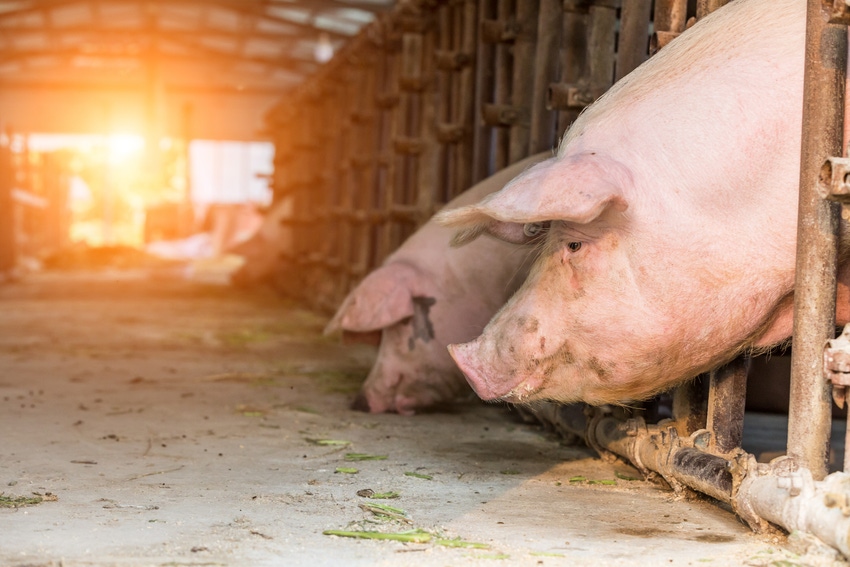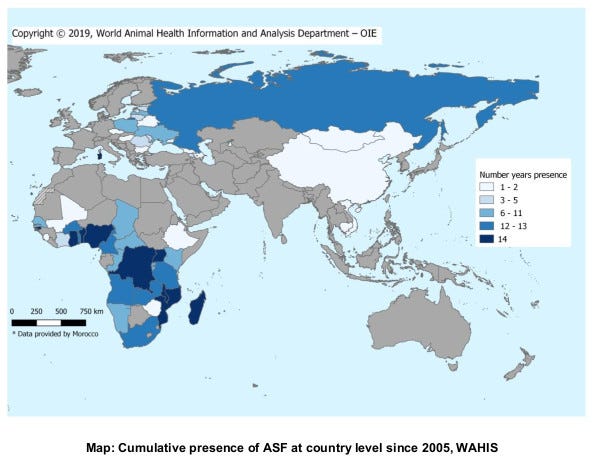OIE launches global ASF initiative
Global effort established to control African swine fever in hopes of complete eradication.

The recent upsurge in the spread of African swine fever (ASF) throughout several regions of the world poses a direct threat to the majority of pig populations worldwide.
While meeting in Paris, France, the 87th general assembly of the World Organization for Animal Health (OIE) national delegates called for the establishment of a global initiative to control ASF in hopes of eradicating it entirely and to reduce its devastating economic effects on the pig industry.
The initiative will be coordinated by OIE and the U.N. Food & Agriculture Organization (FAO).
During the May 26-31 general session, a report on the global ASF situation was presented to the assembly, OIE said, pointing out that, throughout the second quarter of 2018, 25 countries across Europe, Africa and Asia informed OIE of outbreaks of ASF on their territory.

Given the gravity of the situation, with no vaccine against the disease and following the request of its member countries, OIE announced that it is launching a global initiative for the control of ASF.
OIE explained that the initiative will use the "Global Framework for the Progressive Control of Transboundary Animal Diseases (GF-TADs) mechanism to develop, improve and harmonize partnerships and coordination at national, regional and international levels. The objective is to control the disease, strengthen countries’ prevention and preparation efforts and minimize the adverse effects on animal health, animal welfare and international trade, OIE said.
Launched in 2004 by OIE and FAO, the GF-TADs mechanism aims to prevent, detect and control transboundary animal diseases, taking into account their regional dimensions. OIE noted that, in Europe, groups of regional ASF experts have operated under GF-TADs umbrella since 2014, and groups have recently been set up in Asia and the Americas.
In the upcoming months, OIE will establish a work program in collaboration with FAO, taking into consideration the regional initiatives that already exist.
In the summary to the ASF situation report, OIE said the global response "must ensure the well-being of farmers and poverty reduction, protect animal welfare, prevent disastrous economic loses and allow further contribution of the pig sector to global health, wealth, equity and sustainability."
Furthermore, OIE said the development of safe and effective vaccines for domesticated pigs and wild boars "is more important than ever, given the current global ASF threat associated with the worsening epidemiological situation and the lack of a vaccine to contain ASF outbreaks."
In addition to the harmonized approach among countries, the transparency of new and evolving outbreaks is essential to a good understanding of the epidemiology of the disease and to its control and prevention, according to the announcement. OIE has reminded all member countries of the importance of reporting the disease via the World Animal Health Information System (WAHIS), as this builds a complete picture of the disease situation.
Between April 26 and May 9, 2019, OIE said 1,322 outbreaks were ongoing, and 157 new notifications of ASF were sent to OIE via the WAHIS platform.
Given the global socioeconomic repercussions of ASF, controlling the disease is a high priority for both the affected countries and those free of the disease. For this reason, OIE called on its member countries to ensure that they implement its standards and practices for the effective control of ASF, notably through the implementation of:
Programs for prevention, early detection and intervention and compensation policies;
Biosecurity measures;
Pig traceability and movement controls;
Effective official monitoring;
Management of wild pig populations;
Slaughter of animals in accordance with animal welfare rules and the safe disposal of contaminated animal products;
Improvement in collaboration between stakeholders and between countries, and
Programs of ongoing training and awareness raising.
OIE said it is not possible to control ASF without a coordinated response from the different affected sectors due to the complex epidemiology of the virus. In addition to veterinary services, OIE said this includes customs and border control authorities, the pig production industry, universities, forestry management bodies, hunters’ associations, tourist organizations and animal transport organizations.
Clear and transparent communication is essential if all of these actors are to fully understand their roles and responsibilities in the implementation of the required measures, OIE said.
To this end, and to offer support to its member countries, OIE launched the "ASF Kills Pigs" awareness campaign at the beginning of 2019. Initially developed in five languages (French, English, Spanish, Mandarin and Russian), OIE said the campaign has been very successful and can be adapted for use in other languages at the request of countries.
Meeting the complex global challenges of this disease in both affected and disease-free countries requires all actors to be vigilant and to take action. Although ASF poses no risk to human health, it is devastating for the economy of pig farms and for international trade, with repercussions for the livelihoods of farmers and for food safety.
OIE concluded its situation report noting that ASF needs to be understood and managed at local, regional and global levels, "including by preventing further spread through movement of animal and animal products, with particular attention to anthropogenic transmission" of the ASF virus.
Furthermore, OIE called for countries to lead such efforts, with support from international organizations and regional economic communities and development partners.
For more information on its efforts regarding ASF, OIE provided the following links:
OIE communication campaign: ‘ASF Kills Pigs’
Regional sites: Europe and Asia and the Pacific
OIE report on the current ASF situation
GF-TADs Handbook on African swine fever in wild boar and biosecurity during hunting
About the Author(s)
You May Also Like



